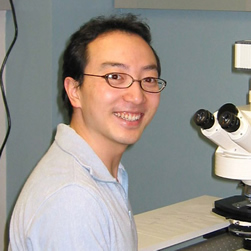| |
| |
| Wei Li, Ph.D., Investigator |
 |
Dr. Li received his medical degree in 1997 from Zhejiang University School of Medicine in China, and his Ph.D. in Neuroscience in 2003 from the University of Texas at Houston, where he studied the organization of reciprocal feedback synapse at the axon terminal of the retinal bipolar cell in Dr. Stephen Massey's laboratory. From 2003 to 2007, as a postdoctoral fellow, he worked with Dr. Steven DeVries at Northwestern University where he investigated synaptic connections between photoreceptors and bipolar neurons in a mammalian retina. Dr. Li joined NEI as the principle investigator of the Unit of Retinal Neurophysiology in 2007. His unit uses a variety of physiological and anatomical techniques to explore retinal synapses and circuits and their functions in vision.
|

|
Research Interests:
Our unit studies the structure and function of retinal synapses and circuits.
Although we know the basic structure and major cell types of the retina, it
remains much of a "black box" in terms of the connections and functions of
these neurons. Our long-term research goal is to understand how the neuronal
circuits are wired in this "black box" under normal conditions and how the
circuits are altered during pathological processes. Both pieces of information
will be crucial for the design of biological and/or prosthetic interventions
aiming to restore vision in many types of blindness caused by retinal
degenerative diseases. Some of the research topics are: 1) we will exploit a
combination of anatomical, physiological, and imaging approaches to study
synaptic connectivity using in vitro slice and flat-mount preparations of the
ground squirrel retina. This is an excellent model system to study the cone
vision, as ground squirrel is one of the rare mammals whose retina is
cone-dominated and resembles the fovea of human retina. 2) We are interested
in studying synaptic alteration and regeneration in the ground squirrel retina
during and after hibernation - another unique feature of the ground squirrel.
3) We are going to use a combination of genetically engineered mouse lines to
study the development of certain synapses and circuits in the mouse retina.
More information about our unit can be found at:
http://www.nei.nih.gov/intramural/retinal_neuro.asp
|
Contact Information:
Dr. Wei Li
7 Memorial Drive,
Building 7, Room 217
Mail Stop Code: 0703
Bethesda, MD 20892-
Telephone: (301) 496-6669 (office),
(301) 496-0000 (laboratory),
(301) 496-1759 (fax)
Email: liwei2@nei.nih.gov
|
|















